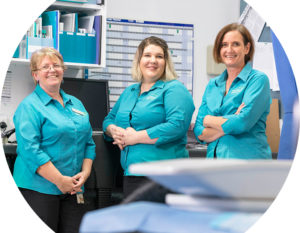What is general
practice accreditation?
Accreditation is an integral part of safe and quality general practice in Australia. It is independent recognition that practices meet the requirements of the governing national industry Standards, set by the Royal Australian College of General Practitioners (RACGP). Accreditation means a practice is meeting minimum safety and quality standards.
It is for general practices of all kinds who are recognised for their commitment to safety, quality and continuous improvements. This includes general practices, medical centres, medical practices, GP clinics and healthcare clinics. It also includes other services such as Aboriginal Medical Services, medical deputising services, after hours services and the Royal Flying Doctor Service (RFDS).
By undergoing independent assessment, the award of accreditation reassures practice owners, practice managers, staff, funding bodies, consumers and patients that the practice is meeting minimum safety and quality standards, as outlined by the RACGP.
Benefits of being an accredited general practice
- Improved patient safety
- Effective risk management
- Patient assurance of a high level of care
- Building a culture of quality
- Continuous quality improvement (CQI)
- Increased insurance provider recognition
- Be eligible for financial incentives from Medicare
(PIP and WIP incentives)
Benefits of being an accredited general practice
- Improved patient safety
- Effective risk management
- Patient assurance of a high level of care
- Building a culture of quality
- Continuous quality improvement (CQI)
- Increased insurance provider recognition
- Be eligible for financial incentives from Medicare (PIP and WIP incentives)
The RACGP Standards for general practices 5th edition
General practice accreditation in Australia is independent recognition that a practice meets the requirements of governing industry standards.
The Royal Australian College of General Practitioners (RACGP) Standards are currently in their 5th edition which was released in October 2017. It had a three-year consultation period with general practitioners, practice managers, nurses, consumers and many other stakeholders.
The National General Practice Accreditation (NGPA) Scheme
The Australian Commission on Safety and Quality in Health Care (the Commission), in collaboration with the RACGP, developed the National General Practice Accreditation (NGPA) Scheme. The Scheme aims to:
- Provide greater choice for general practices seeking accreditation
- Improve support programs for implementation of accreditation, and
- Provide practices with access to national data on accreditation performance to enable bench-marking.
General practice accreditation is voluntary for general practices. Under the NGPA Scheme, general practices wanting to access PIP or WIP - Practice Stream payments must be assessed by an approved accreditation agency,
AGPAL is proudly an approved accreditation agency under the NGPA Scheme
Practice Incentives Program (PIP)
The Practice Incentives Program (PIP) encourages general practices to provide quality care, enhance capacity, and improve access and health outcomes for patients.
General practices wanting to access the PIP must be assessed and accredited by an approved accrediting agency.
The National General Practice Accreditation (NGPA) Scheme
The Australian Commission on Safety and Quality in Health Care (the Commission), in collaboration with the RACGP, developed the National General Practice Accreditation (NGPA) Scheme. The Scheme aims to:
- Provide greater choice for general practices seeking accreditation
- Improve support programs for implementation of accreditation, and
- Provide practices with access to national data on accreditation performance to enable bench-marking.
General practice accreditation is voluntary for general practices. Under the NGPA Scheme, general practices wanting to access PIP or WIP - Practice Stream payments must be assessed by an approved accreditation agency,
AGPAL is proudly an approved accreditation agency under the NGPA Scheme
Practice Incentives Program (PIP)
The Practice Incentives Program (PIP) encourages general practices to provide quality care, enhance capacity, and improve access and health outcomes for patients.
General practices wanting to access the PIP must be assessed and accredited by an approved accrediting agency.
GP and practice manager CPD points/hours
General practitioners and practice managers are awarded continuous professional development (CPD) points and hours for their involvement in achieving AGPAL accreditation. These points help to maintain professional membership status and relevant CPD requirements with industry bodies.
Practice Manager CPD
AAPM members are eligible for up to 20 CPD points per cycle following the achievement of AGPAL accreditation.
GP CPD
GPs are eligible for up to 15 RACGP CPD hours, and ACRRM CPD hours following the achievement of AGPAL accreditation.
GP, practice manager & nurse CPD points/hours
General practitioners, practice managers and practice nurses are awarded continuous professional development (CPD) and/or PDP points and hours for their involvement in achieving AGPAL accreditation. These points help to maintain professional membership status and relevant CPD requirements with industry bodies.
Practice Nurse CPD
APNA members can claim up to 15 CPD hours for their involvement in the AGPAL self-assessment process with their practice.
Practice Manager CPD
AAPM members are eligible for up to 20 CPD points per cycle following the achievement of AGPAL accreditation.
GP QI & CPD and PDP
GPs are eligible for RACGP QI&CPD points, and ACRRM PDP points upon completion of the self-assessment process.
Accreditation across the health and community services spectrum
Find out more about the areas we provide specialist support in
- General practice
- Medical centres
- Medical practices
- Healthcare clinics
- Healthcare centres and services
- Corporate organisations
- Rural and remote healthcare
- Aboriginal Medical Services
- Medical deputising services, and
- Royal Flying Doctor Services (RFDS).
Accreditation FAQs
The thought of someone coming to a practice to assess the team and operations can sometimes be overwhelming. To ensure practice teams feel confident in their preparations, practices are set up for success after speaking with their dedicated AGPAL Client Liaison Officer, completed and submitted a self-assessment and have utilised AGPAL’s resources such as the Policy and Procedure Manual.
Our team is on hand to answer any queries throughout the accreditation process if you have any questions. Some of our most frequently asked questions have been answered below.

